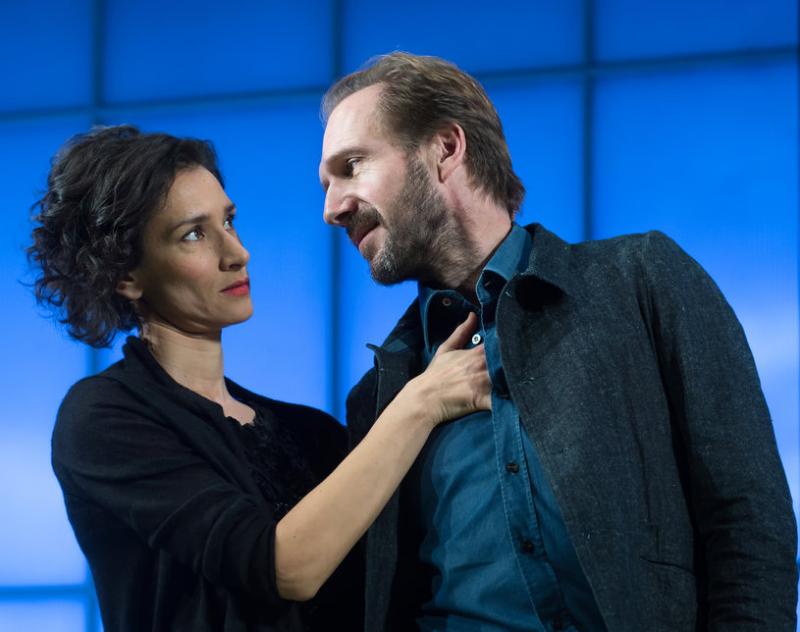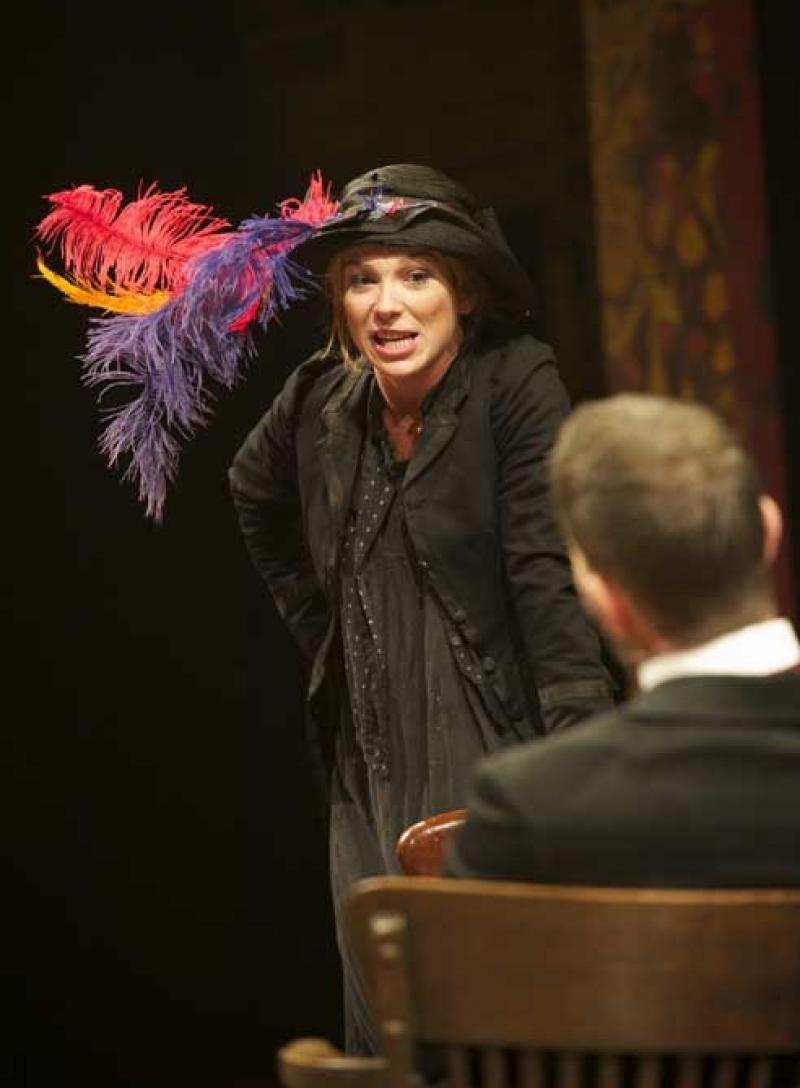Man and Superman, National Theatre | reviews, news & interviews
Man and Superman, National Theatre
Man and Superman, National Theatre
A theatrical trip to Hell has some heavenly moments

How do you take your rom-coms? Full-fat Hollywood schmaltz, Shakespearean, or lean and elegant – a Stoppard perhaps, or Coward? If your answer did not include “With lashings of social philosophy, ethics and a lengthy dream sequence, preferably running north of three hours”, then Man and Superman might not be the play for you.
At full length, George Bernard Shaw’s Man and Superman – not a play at all, according to Shaw, but “a comedy and a philosophy” – runs at over four hours. Thankfully, director Simon Godwin has given it a bit of a trim, cutting things back without losing the play’s greatest oddity of all, the Don Juan in Hell dream-sequence that makes up the better part of Act Three. Cut at the premiere and most often since, it’s the bloodless philosophical heart of a romantic comedy that would much rather talk than embrace.
Fiennes brings a mania, a physical restlessness to proceedings
Shaw’s premise is simple: the Don Juan story is updated for his own times, but with roles reversed. The Don himself – here transformed into one recreational revolutionary, Jack Tanner – becomes the hapless victim of scheming women, rather than their seducer. It’s a story that takes us from rural England to Spain, encountering Brigands (with strong socialist convictions) along the way. A substantial detour to Hell sees the characters revert to their legendary selves, pitting Donna Anna and Don Juan against master-debater The Devil.
There’s an easy, unselfconscious neutrality to Godwin’s modern-dress production. The relocation privileges concept over context, stripping away period fluff and gently pointing up the pertinence of Shaw’s social commentary. It’s a shift that offers little in modern specifics however, anchored as the play is by the moral codes and societal expectations of a different generation, a different world. The joy is in the details: the opening strains of Radio 4, our hero a guest on Desert Island Discs; the Heavenly lift that makes a satisfyingly earthly “ping” when it arrives; the ghetto-mockney chauffeur.
Jack Tanner/Don Juan is the motor that drives this wordy drama, and it’s one speeding smoothly in Ralph Fiennes’ hands. What a pleasure to see Fiennes in a stage comedy after Hamlet, Oedipus, Brand. He seizes on this amateur anarchist with urgency, bringing a mania, a physical restlessness to a role whose natural habitat is the page, or even the radio, rather than the stage. His age, however, entails a rather older cast than we might otherwise expect.
 It’s hard to believe Indira Varma as a girl still young enough to require a guardian. Her authority, her physical presence is not one of youth, despite some lovely mannerisms, and it’s a shift that can’t but unsettle the politics (sexual and otherwise) of the whole play. Ann and Jack are not some Edwardian Beatrice and Benedick, scrapping amorously in middle age, indulged by all around them. They are each revolutionaries, fired by the extremes and passions of youth – by politics, power struggles and what Shaw euphemistically terms the “Life Force”. They have to believe, or else how are we to? A final scene that reads as tragicomically serious here becomes farce – elegant and impeccably executed, not perhaps an ending to match the scope of the preceding three and a half hours.
It’s hard to believe Indira Varma as a girl still young enough to require a guardian. Her authority, her physical presence is not one of youth, despite some lovely mannerisms, and it’s a shift that can’t but unsettle the politics (sexual and otherwise) of the whole play. Ann and Jack are not some Edwardian Beatrice and Benedick, scrapping amorously in middle age, indulged by all around them. They are each revolutionaries, fired by the extremes and passions of youth – by politics, power struggles and what Shaw euphemistically terms the “Life Force”. They have to believe, or else how are we to? A final scene that reads as tragicomically serious here becomes farce – elegant and impeccably executed, not perhaps an ending to match the scope of the preceding three and a half hours.
Nicholas le Prevost splutters and expostulates beautifully as resident conservative Roebuck Ramsden, while the wonderful Tim McMullan (pictured above) brings charisma and countless laughs in the gift role of The Devil/Mendoza. They lead a supporting cast who catch and match Fiennes’ energy throughout, aided by Christopher Oram’s clean designs and some pulsing remixes of Mozart’s Don Giovanni from Michael Bruce.
It’s hard to imagine Man and Superman being staged much better, but whether that’s an argument for fighting for the scarce tickets remaining for this production, or simply staying at home to read the play instead is unclear. Fiennes’ performance is a memorable and a joyous one, an unlikely romantic lead who wins both the audience and the girl. A theatrical Superman? Perhaps.
MORE GEORGE BERNARD SHAW ON THEARTSDESK
Mrs Warren's Profession, Comedy Theatre (2010). Felicity Kendal in plodding revival of Shaw's take on prostitution
 Pygmalion, Chichester Festival Theatre (2010). Rupert Everett's sulky Higgins is outsmarted by Honeysuckle Weeks's Eliza (pictured)
Pygmalion, Chichester Festival Theatre (2010). Rupert Everett's sulky Higgins is outsmarted by Honeysuckle Weeks's Eliza (pictured)
The Doctor's Dilemma, National Theatre (2012). Tragedy is the spoonful of sugar that helps this medical satire go down
Widowers' Houses, Orange Tree Theatre (2014). A timely revival of a timeless satire
The Philanderer, Orange Tree Theatre (2016). Modern-dress Shaw is resonant but long-winded
Saint Joan, Donmar Warehouse (2016). Revival of Shaw classic is a tour de force for Gemma Arterton
rating
Explore topics
Share this article
The future of Arts Journalism
You can stop theartsdesk.com closing!
We urgently need financing to survive. Our fundraising drive has thus far raised £49,000 but we need to reach £100,000 or we will be forced to close. Please contribute here: https://gofund.me/c3f6033d
And if you can forward this information to anyone who might assist, we’d be grateful.

Subscribe to theartsdesk.com
Thank you for continuing to read our work on theartsdesk.com. For unlimited access to every article in its entirety, including our archive of more than 15,000 pieces, we're asking for £5 per month or £40 per year. We feel it's a very good deal, and hope you do too.
To take a subscription now simply click here.
And if you're looking for that extra gift for a friend or family member, why not treat them to a theartsdesk.com gift subscription?
more Theatre
 Troilus and Cressida, Globe Theatre review - a 'problem play' with added problems
Raucous and carnivalesque, but also ugly and incomprehensible
Troilus and Cressida, Globe Theatre review - a 'problem play' with added problems
Raucous and carnivalesque, but also ugly and incomprehensible
 Clarkston, Trafalgar Theatre review - two lads on a road to nowhere
Netflix star, Joe Locke, is the selling point of a production that needs one
Clarkston, Trafalgar Theatre review - two lads on a road to nowhere
Netflix star, Joe Locke, is the selling point of a production that needs one
 Ghost Stories, Peacock Theatre review - spirited staging but short on scares
Impressive spectacle saves an ageing show in an unsuitable venue
Ghost Stories, Peacock Theatre review - spirited staging but short on scares
Impressive spectacle saves an ageing show in an unsuitable venue
 Hamlet, National Theatre review - turning tragedy to comedy is no joke
Hiran Abeyeskera’s childlike prince falls flat in a mixed production
Hamlet, National Theatre review - turning tragedy to comedy is no joke
Hiran Abeyeskera’s childlike prince falls flat in a mixed production
 Rohtko, Barbican review - postmodern meditation on fake and authentic art is less than the sum of its parts
Łukasz Twarkowski's production dazzles without illuminating
Rohtko, Barbican review - postmodern meditation on fake and authentic art is less than the sum of its parts
Łukasz Twarkowski's production dazzles without illuminating
 Lee, Park Theatre review - Lee Krasner looks back on her life as an artist
Informative and interesting, the play's format limits its potential
Lee, Park Theatre review - Lee Krasner looks back on her life as an artist
Informative and interesting, the play's format limits its potential
 Measure for Measure, RSC, Stratford review - 'problem play' has no problem with relevance
Shakespeare, in this adaptation, is at his most perceptive
Measure for Measure, RSC, Stratford review - 'problem play' has no problem with relevance
Shakespeare, in this adaptation, is at his most perceptive
 The Importance of Being Earnest, Noël Coward Theatre review - dazzling and delightful queer fest
West End transfer of National Theatre hit stars Stephen Fry and Olly Alexander
The Importance of Being Earnest, Noël Coward Theatre review - dazzling and delightful queer fest
West End transfer of National Theatre hit stars Stephen Fry and Olly Alexander
 Get Down Tonight, Charing Cross Theatre review - glitz and hits from the 70s
If you love the songs of KC and the Sunshine Band, Please Do Go!
Get Down Tonight, Charing Cross Theatre review - glitz and hits from the 70s
If you love the songs of KC and the Sunshine Band, Please Do Go!
 Punch, Apollo Theatre review - powerful play about the strength of redemption
James Graham's play transfixes the audience at every stage
Punch, Apollo Theatre review - powerful play about the strength of redemption
James Graham's play transfixes the audience at every stage
 The Billionaire Inside Your Head, Hampstead Theatre review - a map of a man with OCD
Will Lord's promising debut burdens a fine cast with too much dialogue
The Billionaire Inside Your Head, Hampstead Theatre review - a map of a man with OCD
Will Lord's promising debut burdens a fine cast with too much dialogue

Add comment